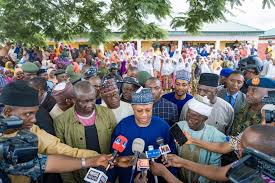Governor Uba Sani of Kaduna State has received recognition for his efforts to improve education in the region. The 100 Most Notable Peace Icons Africa, an organization working with the state government on educational initiatives, commended Governor Sani for implementing free education and student feeding programs.

Ambassador Kingsley Amafibe, Project Director of the organization, highlighted these achievements during a visit to the Kaduna State Government House. “Governor Uba Sani is doing remarkable work in the education sector that many people aren’t aware of,” Amafibe stated. “He has introduced free education from primary through secondary school, along with a free feeding program to encourage students to pursue their studies.”
The free education policy covers all public primary and secondary schools in Kaduna State, removing financial barriers for families. The feeding program provides meals to students, aiming to improve attendance and concentration in class.
Amafibe emphasized the importance of these initiatives, saying, “Education is key to building a great nation. It unlocks opportunities and creates pathways to success.” He added that the organization is in Kaduna to support the state government’s educational efforts.
The African Peace Scholarship Project, a joint initiative between the 100 Most Notable Peace Icons Africa and the Kaduna State government, will work through the Office of the Special Adviser to the Governor on the FeedMe Program. Dr. Fauziya Buhari, who heads this office, will oversee inspections of school facilities and ensure student welfare.
In recognition of his contributions to education and peacebuilding, Governor Sani received the prestigious 100 Most Notable Peace Icons Africa 2024 award. The governor has also been invited to speak at the 14th Peace Achievers International Conference and Awards Night in November 2024.
Amafibe called on other Nigerian states and education stakeholders to follow Kaduna’s example. He stressed the long-term benefits of investing in education for peace and development in the country.
The praise for Kaduna’s educational initiatives comes at a time when many Nigerian states struggle with inadequate funding for schools and low enrollment rates. By removing financial barriers and providing incentives like free meals, Kaduna aims to increase school attendance and improve educational outcomes.
Education experts have long advocated for such programs, arguing that they can help reduce poverty, improve social mobility, and contribute to overall economic development. The success of Kaduna’s initiatives could serve as a model for other states looking to enhance their education systems.
However, challenges remain in sustaining and expanding these programs. Ensuring consistent funding, maintaining quality standards, and reaching all eligible students, especially in rural areas, will be crucial for long-term success.
As Kaduna continues to implement these educational policies, observers will be watching closely to see their impact on student enrollment, academic performance, and broader social indicators. The state’s experience could provide valuable lessons for education reform efforts across Nigeria and potentially in other African countries facing similar challenges.



